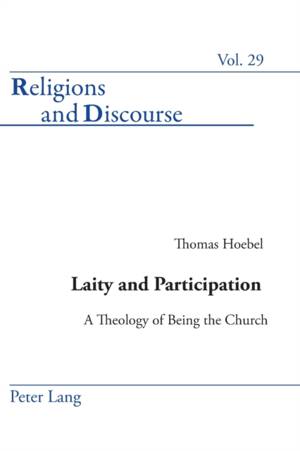
- Afhalen na 1 uur in een winkel met voorraad
- Gratis thuislevering in België vanaf € 30
- Ruim aanbod met 7 miljoen producten
- Afhalen na 1 uur in een winkel met voorraad
- Gratis thuislevering in België vanaf € 30
- Ruim aanbod met 7 miljoen producten
Zoeken
Omschrijving
Right across denominational boundaries lay theology is dominated by negatives: the laity simply defined as the non-ordained, the alleged exclusion of the laity from full participation, the sole focus on what they cannot or should not do, and, above all, the total absence of an ecumenical lay theology.
In a unique approach, this volume sets out to find ways of overcoming these negatives so predominant in current lay theology. The author explores positions and perspectives put forward in Roman Catholic theology from Vatican II up to the present. These are compared and contrasted with concepts and suggestions of present-day Anglican Theology as well as with those of liberative theologies in Latin America and Asia. Rethinking the content, language, and metaphors of lay theology, in the final part of this volume the author proposes a new image for discussing the Church, a model focusing on the interdependence and collaboration of all the people in the Church. This is then used to sketch out the framework for a new type of lay theology. Imbedded in ecclesiology, in the concept of all believers together being the Church, the author endeavours to suggest a lay theology that is indeed positive, ecumenical and universal.
In a unique approach, this volume sets out to find ways of overcoming these negatives so predominant in current lay theology. The author explores positions and perspectives put forward in Roman Catholic theology from Vatican II up to the present. These are compared and contrasted with concepts and suggestions of present-day Anglican Theology as well as with those of liberative theologies in Latin America and Asia. Rethinking the content, language, and metaphors of lay theology, in the final part of this volume the author proposes a new image for discussing the Church, a model focusing on the interdependence and collaboration of all the people in the Church. This is then used to sketch out the framework for a new type of lay theology. Imbedded in ecclesiology, in the concept of all believers together being the Church, the author endeavours to suggest a lay theology that is indeed positive, ecumenical and universal.
Specificaties
Betrokkenen
- Auteur(s):
- Uitgeverij:
Inhoud
- Aantal bladzijden:
- 406
- Taal:
- Engels
- Reeks:
- Reeksnummer:
- nr. 29
Eigenschappen
- Productcode (EAN):
- 9783039105038
- Verschijningsdatum:
- 9/11/2006
- Uitvoering:
- Paperback
- Formaat:
- Trade paperback (VS)
- Afmetingen:
- 152 mm x 229 mm
- Gewicht:
- 539 g

Alleen bij Standaard Boekhandel
+ 166 punten op je klantenkaart van Standaard Boekhandel
Beoordelingen
We publiceren alleen reviews die voldoen aan de voorwaarden voor reviews. Bekijk onze voorwaarden voor reviews.











